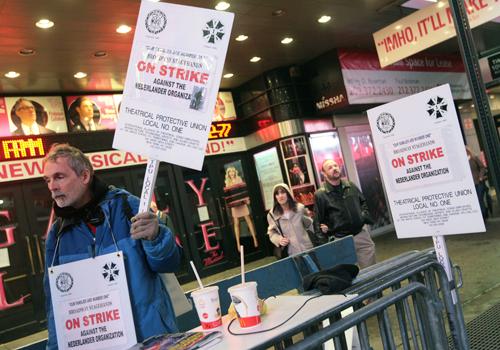Broadway strike negotiations to resume again on Wednesday

Striking stagehand John Senter, left, pickets in front of the Palace Theatre, Monday in New York. Negotiations continued Monday evening between the American League of Producers and the Local 1 Stagehands Union in an attempt to end a strike that has shut d Gary He, The Associted Press
Nov 28, 2007
NEW YORK – No, negotiations between striking Broadway stagehands and theater producers have not run as long as “Cats.” It only seems that way.
Two days of back-to-back marathon sessions have not produced a settlement between Local 1 and the League of American Theatres and Producers, but both sides will return to the bargaining table Wednesday to try again.
Progress reportedly has been slow in solving the thorny dispute that has shut down most of Broadway since Nov. 10, although some headway apparently has been made in lengthy discussions held Sunday, Monday and into Tuesday.
“Talks ended this morning (Tuesday) at 7:30 a.m. without a deal after 13 hours of hard bargaining in what I can only describe as a ‘rain delay’ in the ninth inning of the seventh game of the World Series,” Bruce Cohen, a union spokesman said. “The rainy weather should clear up when talks resume Wednesday.”
All struck shows has been canceled through Wednesday’s matinee performances, the league said.
Get The Daily Illini in your inbox!
The two sides have been meeting since last summer but negotiations only began in earnest after Labor Day. But they weren’t enough to head off a strike as stagehands walked off the job, shutting down such hit shows as “Wicked,” ”Jersey Boys” and “The Lion King” as well as two dozen more plays and musicals.
The union and the league did not get together for much of the lucrative Thanksgiving week, usually one of the best times of the year on Broadway. This year, with most theaters dark, those shows that were still playing, such as “Mary Poppins,” ”Xanadu” and “Dr. Seuss’ How the Grinch Stole Christmas!” (reopened by court order), did hefty business.
Both Local 1 and the league have been under pressure to find a solution as box-office losses climb and other unions that work on Broadway, such as Actors’ Equity Association, began to feel the effects of no paychecks.
Theater-related businesses have been hurt, too. City Comptroller William Thompson has estimated the economic impact of the strike at $2 million a day, based on survey data that includes theatergoers’ total spending on tickets, dining and shopping.
The dispute has focused on how many stagehands are required to open a Broadway show and keep it running. That means moving scenery, lights, sound systems and props into the theater; installing the set and making sure it works; and keeping everything functioning well for the life of the production.





